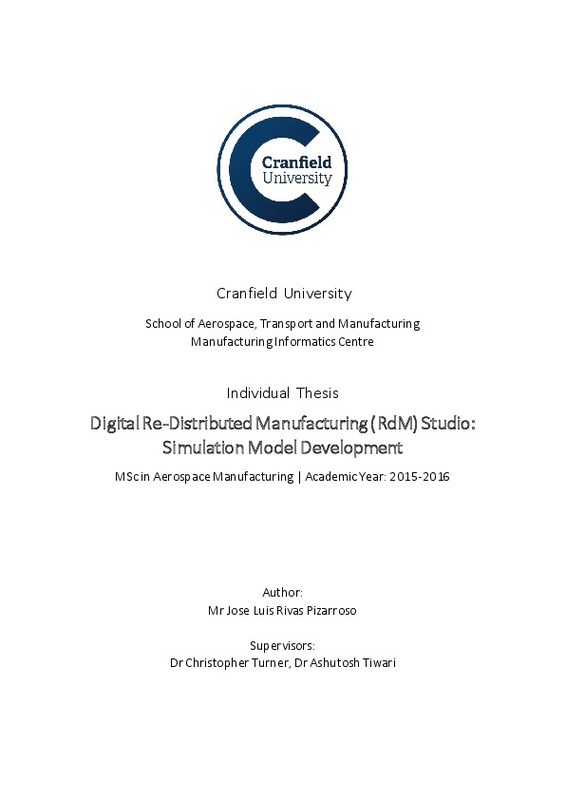JavaScript is disabled for your browser. Some features of this site may not work without it.
Buscar en RiuNet
Listar
Mi cuenta
Estadísticas
Ayuda RiuNet
Admin. UPV
Re-distributed Manufacturing (RdM) Studio: Simulation Model Development
Mostrar el registro sencillo del ítem
Ficheros en el ítem
| dc.contributor.advisor | Yuste Pérez, Pedro
|
es_ES |
| dc.contributor.advisor | Turner, Christopher
|
es_ES |
| dc.contributor.advisor | Tiwari, Ashutosh
|
es_ES |
| dc.contributor.author | Rivas Pizarroso, José Luís
|
es_ES |
| dc.date.accessioned | 2020-05-29T12:05:19Z | |
| dc.date.available | 2020-05-29T12:05:19Z | |
| dc.date.created | 2016-10-13 | |
| dc.date.issued | 2020-05-29 | es_ES |
| dc.identifier.uri | http://hdl.handle.net/10251/144650 | |
| dc.description.abstract | [EN] Consumer Goods Industry has gone through significant changes during the last years. A challenging economic climate, advances in technology and shifts in the consumer¿s attitude have led manufacturers to transform their operating models. Re-Distributed Manufacturing (RdM) aims to address these changes moving towards smaller-scale local manufacture to create a more resilient and connected system, providing not only an agile, user-driven approach that will allow for personalisation and customisation for Product-Service Systems (PSS); but also sustainability through the circular economy. This research aims to develop a simulation environment based on a current RdM business model, also predicting a future RdM business model based on data-driven decisions. Thus, the model has been employed to compare existing and future RdM scenarios to quantify and spot potential benefits of future RdM models. To achieve this, a System Dynamics Simulation has been built. For this study, changing input parameters regarding recyclability, transportation, the level of automation and level of servitization has been the way of representing the future that RdM will bring to this particular case; showing their impact on operating costs and service efficiency. The SD business simulation has been validated by experts and is a good example of how data-driven experimentation can predict the future of RdM, with the parameters and variables selected being critical for the model. The simulation model produced by this research showed promising results: operating costs reduced by 40%, PSS revenues in 6 months and immediate response of the system to customer demand. | es_ES |
| dc.language | Inglés | es_ES |
| dc.publisher | Universitat Politècnica de València | es_ES |
| dc.rights | Reserva de todos los derechos | es_ES |
| dc.subject.classification | ARQUITECTURA Y TECNOLOGIA DE COMPUTADORES | es_ES |
| dc.subject.other | Máster Universitario en Ingeniería Aeronáutica-Màster Universitari en Enginyeria Aeronàutica | es_ES |
| dc.title | Re-distributed Manufacturing (RdM) Studio: Simulation Model Development | es_ES |
| dc.type | Tesis de máster | es_ES |
| dc.rights.accessRights | Abierto | es_ES |
| dc.contributor.affiliation | Universitat Politècnica de València. Departamento de Informática de Sistemas y Computadores - Departament d'Informàtica de Sistemes i Computadors | es_ES |
| dc.contributor.affiliation | Universitat Politècnica de València. Escuela Técnica Superior de Ingeniería del Diseño - Escola Tècnica Superior d'Enginyeria del Disseny | es_ES |
| dc.description.bibliographicCitation | Rivas Pizarroso, JL. (2016). Re-distributed Manufacturing (RdM) Studio: Simulation Model Development. Universitat Politècnica de València. http://hdl.handle.net/10251/144650 | es_ES |
| dc.description.accrualMethod | TFGM | es_ES |
| dc.relation.pasarela | TFGM\57118 | es_ES |
Este ítem aparece en la(s) siguiente(s) colección(ones)
-
ETSIADI - Trabajos académicos [9082]
Escuela Técnica Superior de Ingeniería Aeroespacial y Diseño Industrial






